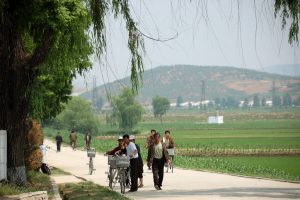A proposal to divide the country’s “general markets” into “specialized markets” reportedly came to naught after North Korean authorities judged that the new markets would be difficult to manage. North Korean authorities are making various attempts to bring markets and other commercial activities under state control, but it appears that a practical plan to accomplish this has yet to emerge.
According to a Daily NK source in Pyongyang on Monday, North Korea’s State Planning Commission sent a proposal to the Central Committee in mid-May calling for the division of existing markets into separate markets for agricultural and livestock products, fishery products, and industrial products.
The proposal sought to strengthen state control over commercial activity in markets by reducing their number, which would involve dividing up general markets into specialized markets for specific types of goods.
These specialized markets would only be allowed to sell certain products, such as agricultural and livestock items or industrial goods.
The proposal also included a plan that would have restricted sales of shoes, clothing, and other industrial or mechanical goods to state procurement shops – similar to the state-run food stores currently in operation.
The proposal also predicted that the division of general markets into specialized markets would lead to an increase in market fees, which would help expand the state’s tax revenue.
The Central Committee rejected the proposal, however, saying that dividing products into specialized markets would prove difficult, and that managing and controlling the new markets would require more personnel.

In fact, North Korea’s efforts to establish state-run food stores has proven difficult due to a lack of interest in the stores by localities and farmers. The shops have so far generated little income for the state.
Ultimately, North Korea’s leadership determined that creating specialized markets and restricting industrial goods to state-run shops would be unrealistic.
North Korea’s leadership also expressed concern about “public sentiment.” Specifically, the concern was that public discontent could increase if general markets were converted into markets that only deal with agricultural and livestock products.
Some South Korean media outlets have reported that North Korean authorities attempted to reduce market-related activities in the country by shrinking general markets into specialized markets, along with forcing them to buy industrial materials at state-run shops.
Though the Central Committee did in fact discuss the market conversion proposal, multiple Daily NK sources in the country confirmed that the plan was not put into action because it was rejected by the leadership.
That being said, North Korea’s leadership did reportedly accept a proposal to boost tax revenue.
A Daily NK source said that the authorities will apply a differentiated market fee rate on industrial goods at sales points. The rate will depend on whether the item is domestically produced or imported, and on whether locally produced goods are from private manufacturers or state enterprises.
The North Korean leadership’s efforts to reform the country’s market system with a view to strengthen state control have led to measures that will increase the taxes business people pay, a development that is expected to cause significant discontent among the North Korean people.
Meanwhile, the State Planning Commission cadre who proposed the specialized market scheme was reportedly exiled to the agricultural community of Rinsan County, North Hwanghae Province, for “generating policy confusion” with his “wrong-headed proposal.”

















